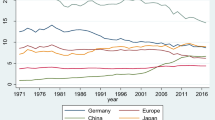Abstract
This paper provides a quantitative assessmet of a cost shift from labor to energy by means of a carbon/energy tax. The analysis utilizes a general equilibrium model for the European Community, placing the emphasis on the modeling of labor supply. The paper highlights the importance of the feedback from an induced increase in labor demand to wage formation. It shows that the goals of CO2 reduction and improved employment are complementary, provided the reduction in labor costs financed by the carbon/energy tax is not offset by increased wage claims. Under this condition, reduced CO2 is consistent with an increase in GDP.
Similar content being viewed by others
References
Armington, P. S. (1969), ‘A Theory of Demand for Products Distinguished by Place of Production’. IMF Staff Papers 16, 159–178.
Barker, T. and B. Gardiner (1995), ‘Employment, Wage Formation and Pricing in the European Union: Empirical Modelling of Environmental Tax Reform’. MEGEVE-E3ME Working Paper No. 43.
Bovenberg, A. L. and F. van der Ploeg (1993), ‘Consequences of Environmental Tax Reform for Involuntary Unemployment and Welfare’, mimeo.
Burniaux, J.-M., J. P. Martin, G. Nicoletti, and J. Oliveria-Martins (1992), ‘GREEN — A Multi-Sector, Multi-Region General Equilibrium Model for Quantifying the Costs of Curbing CO2 Emissions: A Technical Manual’. OECD Working Paper No. 116, Paris.
Conrad, K. (1993), ‘Problems of Modeling CO2 Reduction with GE Models’, in W. Kuckshinrichs, W. Pfaffenberger, W. Ströbele, eds., Economics of the Greenhouse Effect. Jülich.
Conrad, K. and J. Wang (1993), ‘Quantitative Umweltpolitik: Gesamtwirtschaftliche Auswirkungen einer CO2-Besteuerung in Deutschland (West)’. Jahrbücher für Nationalökonomie und Statistik 212, 309–324.
European Commission (1994), ‘Taxation, Employment and Environment: Fiscal Reform for Reducing Unemployment’ European Economy 56, 137–178.
EUROSTAT (1992), National Accounts ESVG: Input-Output Tables 1985. Luxembourg.
Goulder, L. H. (1991), ‘Effects of Carbon Taxes in an Economy with Prior Tax Distortions: An Intertemporal General Equilibrium Analysis for the U.S.’, mimeo.
Lee, K. C. and M. H. Pesaran (1993), ‘The Role of Sectoral Interactions in Wage Determination in the UK Economy’. The Economic Journal 103, 21–53.
Manne, A. S. and R. G. Richels (1992), Buying Greenhouse Insurance: The Economic Costs of CO 2 Emission Limits. Cambridge, MA.
Pearce, D. (1991), ‘The Role of Carbon Taxes in Adjusting to Global Warning’. The Economic Journal 101, 938–948.
Philip, J.-M. and H. Rogner (1992), ‘HERMES: A Macrosectoral Model for the German Economy’, in Commission of the European Communities (1992), HERMES: Harmonized Econometric Research for Modelling Economic Systems. Amsterdam.
Standaert, S. (1992), ‘The Macro-Sectoral Effects of an EC-wide Energy Tax: Simulation Experiments for 1993–2005’, in Commission of the European Communities, ed., European Economy, Special Edition No. 1: The Economics of Limiting CO 2 Emissions. Brussels, Luxembourg.
von Weizsäcker, E. U. and J. Jesinghaus (1992), Ecological Tax Reform: A Policy Proposal for Sustainable Development. London.
Welsch, H. (1995), ‘Joint vs. Unilateral Carbon/Energy Taxation in a Two-Region General Equilibrium Model for the European Community’. Discussion Paper. University of Cologne: Institute of Energy Economics.
Welsch, H. and F. Hoster (1995), ‘A General Equilibrium Analysis of European Carbon/Energy Taxation: Model Structure and Macroeconomic Results’. Zeitschrift für Wirtschafts-und Sozialwissenschaften 115, 275–303.
Author information
Authors and Affiliations
Rights and permissions
About this article
Cite this article
Welsch, H. Recycling of carbon/energy taxes and the labor market. Environmental and Resource Economics 8, 141–155 (1996). https://doi.org/10.1007/BF00357361
Accepted:
Issue Date:
DOI: https://doi.org/10.1007/BF00357361




